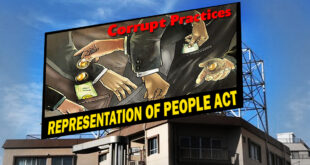- In a judgment in December 2022 — Neeraj Dutta v. State (Govt. of NCT of Delhi) — the Constitution Bench of the Supreme Court came down heavily on corruption among public servants in the country and lowered the bar for the quantum of evidence required to convict persons charged with corruption.
- This verdict was hailed by those who desire probity in public administration and demand deterrent penalties for criminal activities.
- This was not the first time that the Supreme Court was speaking on endemic corruption in our system; on many occasions in the past, the court gave equally strong expression to this scourge that afflicts our public administration.
- But in spite of its unequivocal stand, the extent of corruption in public life remains undiminished.
The ruling
- Through its ruling, the Supreme Court debunks the myth that absolute proof of guilt alone can help convict an offender.
- The court has now laid down that even if prosecution witnesses turn hostile, a conviction would be in order if all the circumstantial evidence marshalled by the prosecution and produced before the court points unmistakably to the guilt of the accused.
- This is a great step towards ensuring integrity in public services, especially in the ‘superior’ services such as the Indian Administrative Service and Indian Police Service.
- There are two aspects to the fight against corruption: the severity of the law and its application; and the strength of public opinion that would help carry forward the campaign for a clean public life. Both are equally important if we are to rid the country of the weakest link in a burgeoning bureaucracy.
- There is often a cry in favour of making our laws more stringent so that the wrongdoer is punished.
- Even law-makers and the public sometimes don’t understand that deterrence works only up to a point. The demand for the death penalty for a wide range of offences is therefore misdirected.
- Legislators disregard the fact that the more you enhance penalties for criminal behaviour, the higher will be the quantum of proof required by the courts to be convinced of the guilt of those arraigned before them.
- It is probably this hard reality that persuaded the Constitutional Bench to lower the bar for the quantum of evidence required to convict persons charged with corruption.
- In effect, the Supreme Court has set the standard of ‘preponderance of probability’, a yardstick that is usually not acceptable to sustain conviction in criminal trials.
- Earlier, the belief was that only conclusive proof, namely, proof that does not leave an iota of doubt in the minds of the courts, was required. This has now been diluted.
- The court has directed that infirmities such as non-availability of the complainant, either because he is dead or otherwise not traceable, should not stand in the way of accepting the story of the prosecution.
- The same liberal application of the law of evidence will now apply to cases where prosecution witnesses turn hostile, either because of inducement or intimidation.
- It is well known that some powerful people are accused of ‘buying’ prosecution witnesses. Some lawyers have also been part of this, bringing shame to the criminal justice system and to the bar.
- The apex court is aware of this and believes it can no longer be a mute spectator.
Corruption everywhere
- At the cost of being branded a cynic, I believe that corrupt public servants will find other means of covering up their misdeeds.
- This is because many are willing to offer bribes to public servants, either on their own or on demand. This nexus between offender and victim has become a part of our ethos.
- It is undeniable that the misdeeds of public servants are partly attributable to political corruption.
- The current situation in many States has become so bad that no service to which a citizen is entitled as a fundamental right can be obtained without greasing the palm of someone in the administrative or political hierarchy.
- Jobs are often sold at a price. Many applicants are prepared to pay without a complaint as there is acute unemployment. No approval for construction of a building or for registration of a property is possible without payment of a bribe.
- This situation has only worsened in many States. Several public servants involved in this racket cite illegal and rapacious demands from the political hierarchy as the reason for such bribes.
- Whether this is really the case or not, many corrupt officials in the administration are willing conduits and avail themselves of the opportunity to line their pockets.
- The latest Supreme Court judgment may not deter people from corruption. However, that is no reason for us to give up the fight. It is here that we need enlightened opinion leaders who are not scared of taking on powerful elements in politics or in administration.
SOURCE: THE HINDU, THE ECONOMIC TIMES, PIB
 Chinmaya IAS Academy – Current Affairs Chinmaya IAS Academy – Current Affairs
Chinmaya IAS Academy – Current Affairs Chinmaya IAS Academy – Current Affairs



